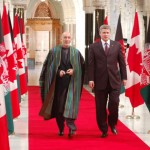Canada's Tough Afghan Choice
 Regardless of their personal feelings, Prime Minister Stephen Harper and Defense Minister Peter MacKay are committed to withdrawing fighting forces by next summer. So far, they show no inclination to change their minds.
Regardless of their personal feelings, Prime Minister Stephen Harper and Defense Minister Peter MacKay are committed to withdrawing fighting forces by next summer. So far, they show no inclination to change their minds.
There’s nothing quite like seeing reality for oneself.
And that was the case with an all-party delegation of MPs who visited Canadians in Afghanistan to have a five-day look at what our 2, 800 troops are doing and, more importantly, what Canadian soldiers mean to both our allies and the Afghanis.
Bob Rae, Liberal MP and perennial challenger to lead the party (now that’s he’s apparently abandoned the NDP) and the likely successor to Michael Ignatieff, spoke for the group when he opined: “We have an obligation to see this through.”
That’s basically how our soldiers feel (though the generals can’t say so). And it’s certainly how the Americans feel, as reflected by Secretary of State Hillary Clinton when she hinted a while back that the U.S. would dearly appreciate it if Canada could find a way to keep its troops in Afghanistan past the summer of 2011.
Hillary is one of the few bright spots in the administration of President Barack Obama -- a surprise to some (including me) who resented her when she was campaigning for the nomination of the Democratic Party.
Another bright spot is Secretary of Defense Robert Gates, who occupied that post under President George W. Bush. That’s about it. The rest seem a collection of duds and pals of Obama who are contributing to make his administration mindful of Jimmy Carter’s.
Rae went further and pledged the Liberal party to back serious discussions between Canada and NATO and alliance allies about a future role for our troops in Afghanistan.
Regardless of their personal feelings, Prime Minister Stephen Harper and Defense Minister Peter MacKay are committed to withdrawing fighting forces by next summer. So far, they show no inclination to change their minds.
If Rae is right when he says the Liberals think a post-2011 role in Afghanistan for our military is “very important,” and if a motion is presented in the Commons to extend our stay in some way, it’s hard to see Harper rejecting it.
Of course Rae and the Parliamentarians see a future role as training the Afghan National Army (ANA), not the present operational and fighting role. That’s semantics. Soldiers are soldiers, and cannot be guaranteed a stay-at-home, non-fighting role, especially when they’ve proven excellent in the field, capable of meeting any challenge.
Would “training” Afghan troops include leading them on patrol or fighting missions? Dunno. It’s what the Americans did in the early days of the Vietnam War when they were officially “advisors,” but led by example.
General Stanley McChrystal, commanding upwards of 100,000 NATO troops in Afghanistan and a fighting soldier himself, has made it clear he’d relish Canadian troops staying without a deadline. He’s paid the ultimate compliment to our military by putting his troops under Canadian command in Kandahar – something Americans rarely do.
It would be unfortunate if Canada were to lapse into purely peacekeeping missions, or non-operational roles that are risk-averse. Recruiting would lag and morale would sag, where right now our army is tough, competent, and humane.
NDP MP Jack Harris also noted it’s important that Canada not forsake Afghanistan, so the sacrifice will not be in vain for the 146 soldiers, one diplomat and one journalist who’ve been killed.
As for the military – it does what is asked of it, but it can contribute more in Afghanistan than it can, say, in Congo, Haiti or Darfur.